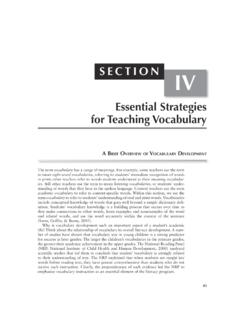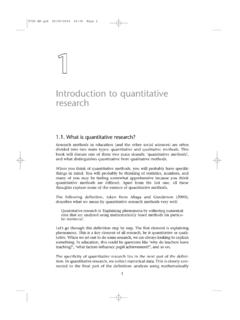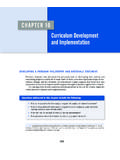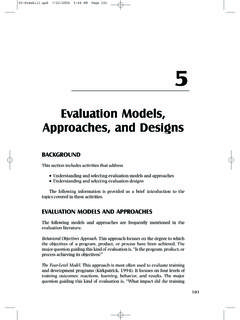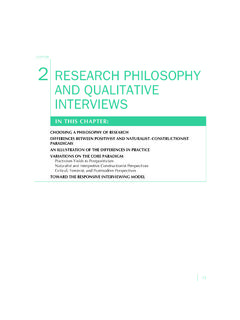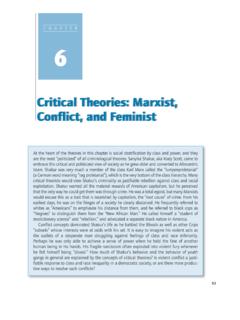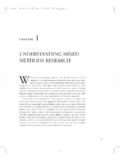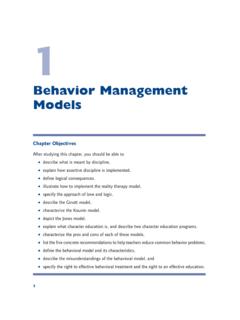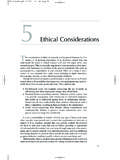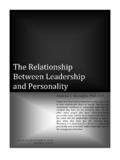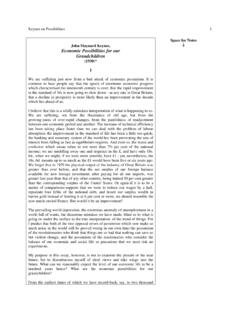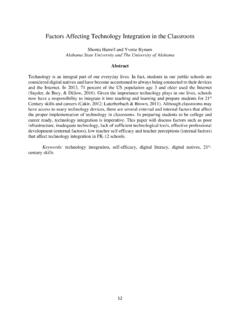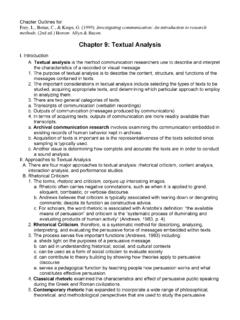Transcription of What Is Propaganda, and How Does It Differ From …
1 1 what Is propaganda , and HowDoes It Differ From persuasion ? propaganda is a form of communication that attempts to achievea response that furthers the desired intent of the is interactive and attempts to satisfy the needs of both per-suader and persuadee. A model of propaganda depicts how elementsof informative and persuasive communication may be incorporatedinto propagandistic communication, thus distinguishing propagandaas a specific class of communication.
2 References are made to pasttheories of rhetoric that indicate propaganda has had few systematictheoretical treatments prior to the 20th century. Public opinion andbehavioral change can be affected by has been studied as history, journalism, political science,sociology, and psychology, as well as from an interdisciplinary per-spective. To study propaganda as history is to examine the practices ofpropagandists as events and the subsequent events as possible effects of pro-paganda.
3 To consider propaganda as journalism is to understand how newsmanagement or spin shapes information, emphasizing positive featuresand downplaying negative ones, casting institutions in a favorable examine propaganda in the light of political science is to analyze 11/7/2005 2:10 PM Page 1ideologies of the practitioners and the dissemination and impact of publicopinion. To approach propaganda as sociology is to look at social move-ments and the counterpropaganda that emerges in opposition.
4 To investigatepropaganda as psychology is to determine its effects on individuals. Pro-paganda is also viewed by some scholars as inherent thought and practice inmass culture. A more recent trend that draws on most of these allied fieldsis the study of propaganda as a purveyor of ideology and, to this end, is largelya study of how dominant ideological meanings are constructed within themass media (Burnett, 1989, pp. 127 137). Ethnographic research is one wayto determine whether the people on the receiving end accept or resist domi-nant ideological book approaches the study of propaganda as a type of communica-tion.
5 persuasion , another category of communication, is also examined. Theterms propagandaand persuasionhave been used interchangeably in the lit-erature on propaganda , as well as in everyday speech. propaganda employspersuasive strategies, but it differs from persuasion in purpose. A communi-cation approach to the study of propaganda enables us to isolate its com-municative variables, to determine the relationship of message to context, toexamine intentionality, to examine the responses and responsibilities of theaudience, and to trace the development of propagandistic communication asa believe there is a need to evaluate propaganda in a contemporarycontext free from value-laden definitions.
6 Our objectives are (a) to providea concise examination of propaganda and persuasion , (b) to examine therole of propaganda as an aspect of communication studies, and (c) to ana-lyze propaganda as part of social, religious, and political systems through-out history and contemporary DefinedPropaganda,in the most neutral sense, means to disseminate or promoteparticular ideas. In Latin, it means to propagate or to sow. In 1622,the Vatican established the Sacra Congregatio de propaganda Fide,mean-ing the sacred congregation for propagating the faith of the Roman CatholicChurch.
7 Because the propaganda of the Roman Catholic Church had as itsintent spreading the faith to the New World, as well as opposing Pro-testantism, the word propagandalost its neutrality, and subsequent usagehas rendered the term pejorative. To identify a message as propaganda is tosuggest something negative and dishonest. Words frequently used as syn-onyms for propagandaare lies, distortion, deceit, manipulation, mind2 propaganda and 11/7/2005 2:10 PM Page 2control, psychological warfare, brainwashing,and tothe word propagandais illustrated by the following example.
8 When the leg-endary film director John Ford assumed active duty as a lieutenant com-mander in the Navy and chief of the Field Photographic Branch ofthe Office of Strategic Services during World War II, he was asked by hiseditor, Robert Parrish, if his film, The Battle of Midway, was going to be apropaganda film. After a long pause, Ford replied, Don t you ever let mehear you use that word again in my presence as long as you re under mycommand (Doherty, 1993, pp.)
9 25 26). Ford had filmed the actual battleof Midway, but he also included flashbacks of an American family at homethat implied that an attack on them was an attack on every American. Forddesigned the film to appeal to the American people to strengthen theirresolve and belief in the war effort, but he resisted the idea of making filmsfor political indoctrination. According to our definition, The Battle of Midwaywas a white propaganda film, for it was neither deceitful nor false, thesource was known, but it shaped viewer perceptions and furthered thedesired intent of the filmmaker to vilify the enemy and encourage implying propaganda that have gained popularity today are spinandnews management.
10 Referring to a coordinated strategy to minimize neg-ative information and present in a favorable light a story that could be dam-aging to self-interests. Spinis often used with reference to the manipulationof political information; therefore, press secretaries and public relations offi-cers are referred to as spin doctors when they attempt to launder the news(Kurtz, 1998). Besides being associated with unethical, harmful, and unfairtactics, propaganda is also commonly defined as organized persuasion (DeVito, 1986, p.)

